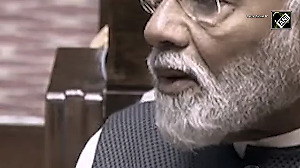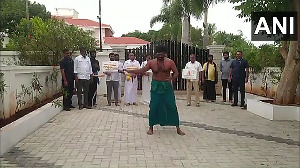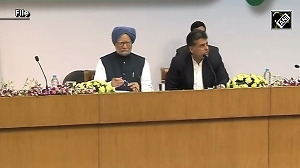Jamaat ud-Dawa chief and Lashkar-e-Tayiba founder Hafiz Mohammed Saeed cannot be prosecuted for involvement in the Mumbai terror attacks without 'concrete evidence' against him, Pakistan's top law official said on Wednesday.
"The government has the evidence provided by the United Nations Security Council that can only keep Saeed behind bars for a certain period of time under the Maintenance of Public Order law," said Attorney General Latif Khosa, an aide of President Asif Ali Zardari.
"However, we have no material whatsoever to establish Saeed's direct or indirect link with the Mumbai carnage," Khosa said. If Pakistan had any legal proof against Saeed, either provided by the Indian government or otherwise, he certainly would have been facing trial along with the other accused in the anti-terrorism court in Rawalpindi, he said.
"India wants us to prosecute him for his involvement in the Mumbai attacks but how could we do so without concrete evidence? Law demands evidence. Let it be very clear to everyone that we are not giving any latitude to Saeed or anyone else," he said.
Saeed has been described as the mastermind of the terror attack on Mumbai last year that killed over 180 people and India has asked Pakistan to take action against him.
Saeed was detained after the UN Security Council declared the JuD a terrorist organistaion in December last year but was freed from house arrest on the orders of the Lahore High Court on June 2. Interior Minister Rehman Malik has also made it clear that the government will not arrest Saeed. He said 'solid evidence' is needed to prosecute Saeed.
Five LeT operatives, including its operations commander Zakiur Rehman Lakhvi and computer expert Zarar Shah, are currently facing the trial in an anti-terror court in Rawalpindi in connection with the Mumbai attacks. The next hearing of the case is scheduled for August 29.
Khosa also sought to dispel the impression that the Punjab government had withdrawn or indicated its withdrawal from an appeal filed jointly with the federal government in the Supreme Court to challenge Saeed's release on the orders of the high court.
"There was some sort of misunderstanding at some level but it has been sorted out," he said. When his attention was drawn to the statement by Punjab Law Minister Rana Sanaullah, that the federal government was not 'assisting' the province in the case by providing evidence against Saeed, Khosa questioned how this could be possible in a case where the centre, which was already vulnerably placed, would not extend cooperation to the provincial authorities.
Asked about loopholes pointed out by the Lahore High Court with regard to Saeed's detention, Khosa said it was the court's decision and the government 'respected it'.
"We even provided the high court classified information about Saeed and the JuD but to no avail," he said. Khosa had earlier told the high court that Saeed must not be freed as his organisation has links with the al-Qaeda.
Asked what further evidence the federal or provincial governments have to challenge the Lahore High Court's decision to free Saeed and his close aide Colonel (Retired) Nazir Ahmed, Khosa said, "We are very much confident that the UN Security Council resolutions and other classified information we have will substantiate our plea."
The Supreme Court is expected to take up petitions filed by the federal and Punjab governments challenging Saeed's release on Thursday.






 © 2024 Rediff.com -
© 2024 Rediff.com -